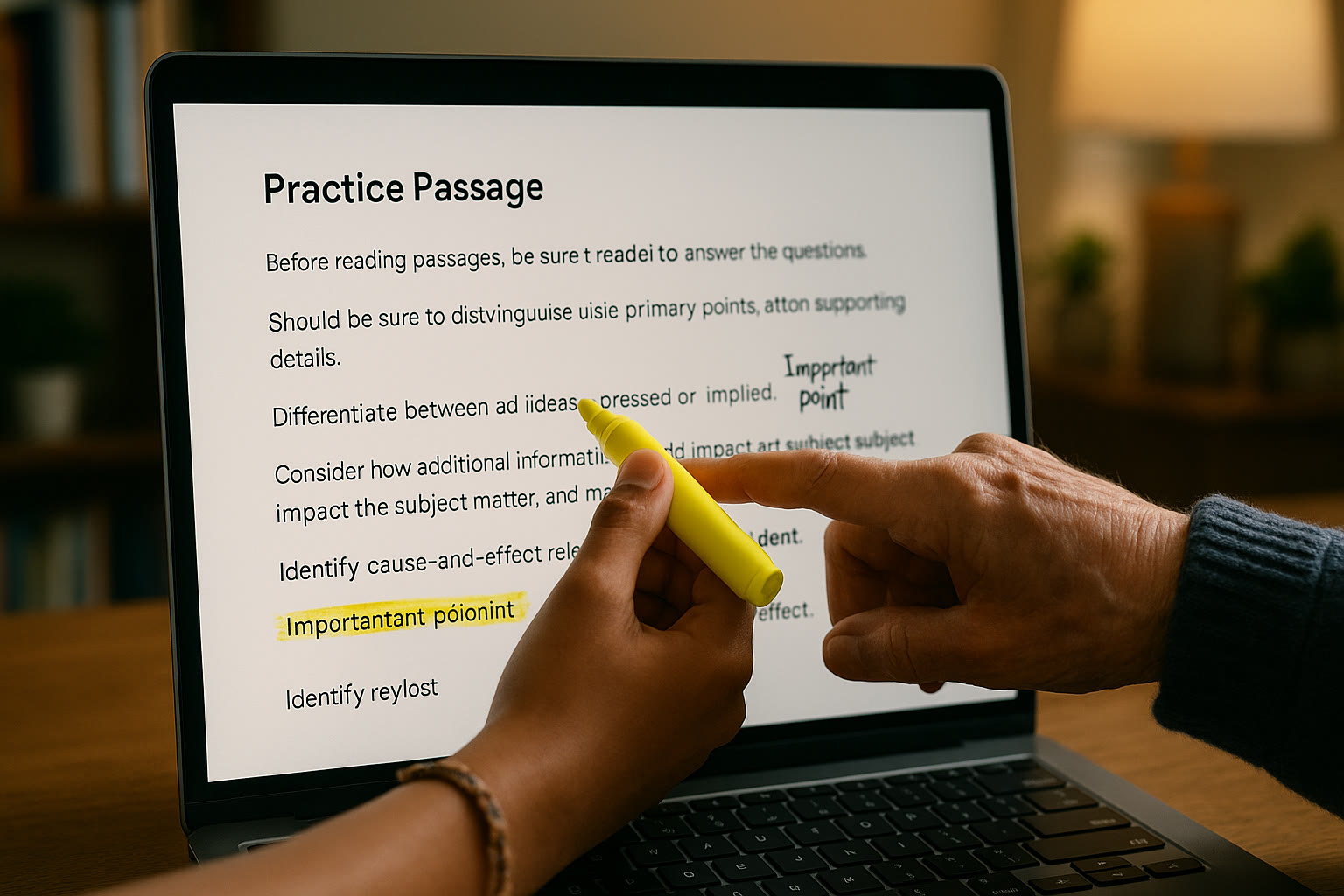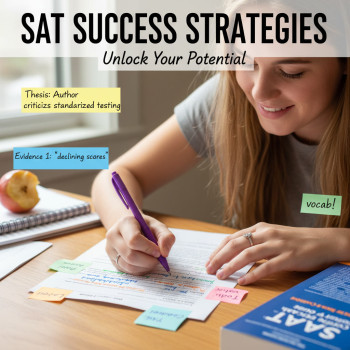Why Grandparents Matter More Than You Think
When conversations about the SAT come up, it’s easy to picture students hunched over practice tests, parents making schedules, and tutors dropping into calendars. What’s often missing from that picture — but quietly powerful — are grandparents. Grandparents bring calm, continuity, perspective, and a different kind of encouragement that can help a teen not just study harder, but study smarter.
This post is written for grandparents who want to help, for parents who want to invite that help, and for families who want a thoughtful, practical plan to turn generational love into college-readiness support. It’s about small, meaningful actions: helping with timing and routines, being the emotional anchor during stress, offering tech- and logistics-friendly assistance, and knowing when to step in with targeted academic support — including how Sparkl’s personalized tutoring can fit naturally into a family’s plan.

Understanding the Digital SAT: A Quick, Friendly Primer
Before you begin supporting, it helps to know what you’re supporting. The SAT moved to a digital format in the U.S. in 2024, and that change matters in practical ways. The digital SAT is adaptive in sections, shorter overall, includes an embedded calculator on math sections, and is administered through the Bluebook app on approved devices. It’s still an important part of many college applications and scholarship considerations, so helping your teen navigate it thoughtfully is an excellent investment of time and encouragement.
Key points grandparents should keep in mind:
- The test is taken on a laptop, tablet, or school-managed device using the Bluebook app. Familiarity with the device and app reduces test-day anxiety.
- Practice resources are available for free — students often use personalized plans that adapt to strengths and weaknesses.
- Scores and reports are presented in a new digital-friendly format that emphasizes actionable insights (e.g., how a teen performed across skill areas), so reviewing results with curiosity — not criticism — is most helpful.
Start with Emotional Support: The Small Things That Add Up
Grandparents often excel at steady, wise encouragement. For a teen facing the pressure of college admissions, that steadiness matters. Emotional support looks less like coaching and more like being present in the ways teens really appreciate.
Practical emotional ways to help
- Listen first. Let teens name their worries — deadlines, grades, or the fear of disappointing someone. That alone reduces stress.
- Keep perspective. Share stories (brief and upbeat) about challenges you or others faced, emphasizing resilience over perfection.
- Celebrate non-test wins. A completed practice section, improved time on a reading passage, or simply sticking to a study habit deserves recognition.
- Create ritual: a weekly check-in call, a “good luck” note before a practice test, or a favorite snack on test day. Rituals anchor teens in a predictable, soothing routine.
Practical Help: Routines, Time Management, and Test-Day Logistics
One of the best ways grandparents can help is by making the path smoother. Here are discrete, doable ways to help with routines and logistics without stepping on the teen’s independence.
Weekly structure and time blocks
Many teens are juggling schoolwork, activities, and social lives — time feels scarce. Grandparents can help by supporting a study routine that’s realistic and gentle.
- Encourage short, focused study blocks (25–50 minutes) followed by a break. The Pomodoro-style approach improves retention.
- Help them create a visible study schedule — a whiteboard or calendar in a shared space — and cheer when they keep it.
- Offer to be the quiet presence for a weekly 60-minute study session. Your presence can make focused study feel less solitary.
Test-day logistics checklist
On test day, practical support translates into calm. Provide help with things that reduce friction so your teen can focus on the test.
| Item | Why it helps | Grandparent role |
|---|---|---|
| Device & Bluebook setup | Prevents technical surprises | Help install or update the Bluebook app, ensure the device meets requirements or coordinate a loaner device |
| Transportation/arrival plan | Reduces rush and anxiety | Drive your teen, coordinate with parents, or confirm bus/train times |
| Comfort items | Small comforts reduce stress | Pack a favorite snack, a water bottle, or a calming note |
| Practice session pre-check | Builds confidence | Run a low-pressure Bluebook practice test the week before |
| Post-test decompression | Relieves pressure after the exam | Plan a fun, relaxing activity after the test |
When to Offer Academic Help — and When to Step Back
Grandparents don’t need to be tutors to make a difference. But there are smart ways to offer academic support without creating tension or taking away responsibility from the student.
Helpful academic roles for grandparents
- Quiz partner: Ask reading-comprehension questions after a practice passage or time them on math drills while staying encouraging.
- Accountability buddy: Check that practice plans are being followed and celebrate milestones.
- Study environment curator: Create a quiet, comfortable study nook if space allows — good lighting, minimal distractions, and a clear surface.
When to step back
If the teen prefers private study, avoid hovering. If stress spikes, back off and offer emotional support instead. The best support balances involvement with respect for the teen’s autonomy.
Smart Study Strategies Grandparents Can Promote
Encouraging study strategies that match how the digital SAT works makes grandparents’ support especially effective.
Strategies to encourage
- Official practice: Encourage use of official practice tests and apps. Authentic practice improves familiarity with format and timing.
- Targeted practice: Suggest focusing on weakest content areas identified by practice tests rather than repeating the same sections endlessly.
- Mixed practice: Combine reading, writing, and math practice in one study session to mimic test stamina demands.
- Reflective review: After each practice test, ask two questions: “What surprised you?” and “What would you change next time?” Small reflections build big improvements.
Using Technology Wisely: Device Readiness and App Familiarity
Because the SAT is digital, device familiarity matters. Grandparents can be the steady hand that makes technology feel less intimidating and more manageable.
- Set up Bluebook test practice together. A supervised run-through lowers tech anxiety.
- Check device battery, updates, and permitted settings the night before a practice session or test.
- Encourage practice with the embedded calculator and with switching calculator modes if the app offers options. Familiarity saves time during math questions.

How to Talk About Scores and Progress — The Language of Support
Scores are informative, not identity-defining. Framing matters. Grandparents can model constructive responses that keep motivation high.
Supportive language examples
- Instead of: “Why didn’t you get a higher score?” try: “What do you think helped you the most on this test?”
- Instead of: “You must study more,” try: “How could I help make studying easier for you this week?”
- Instead of comparing to others, try: “Let’s celebrate what improved and plan one small change for the next practice.”
Making a Study Plan: A Practical 12-Week Roadmap
Many teens respond well to a calm, consistent plan. Here’s a sample 12-week roadmap grandparents can support — not lead — that balances practice, review, and rest. Use it as a template and adapt it to the student’s school schedule and test date.
| Weeks | Focus | Grandparent role |
|---|---|---|
| 1–2 | Baseline practice test, review results, set realistic target score | Help schedule and celebrate completion; discuss goals |
| 3–5 | Target weak areas (math concepts, vocabulary/reading strategies) | Be an accountability partner; quiz gently |
| 6–8 | Timed, mixed practice; focus on pacing | Offer quiet, distraction-free time and a calm presence during practice |
| 9–10 | Full-length practice tests under test-like conditions | Simulate logistics and test-day routine; provide comfort items |
| 11–12 | Light review, rest, and confidence-building | Encourage sleep, healthy meals, and stress-reducing activities |
When to Suggest Extra Help: Tutoring and Personalized Support
Sometimes a teen needs targeted instruction — a concept coach, a pacing strategy, or a confidence boost. Grandparents can gently suggest professional help when they notice persistent gaps, repeated frustration, or plateauing scores. The right tutoring is personalized: 1-on-1 guidance, tailored study plans, and expert tutors who can adapt to the student’s learning style.
If you’re considering tutoring, look for programs that offer customized plans informed by diagnostic practice tests and that use data to guide study — approaches that complement what the teen is already doing. When it fits, mention options like Sparkl in a practical way: Sparkl offers personalized 1-on-1 guidance, expert tutors who tailor plans to a student’s strengths and weaknesses, and AI-driven insights to target practice efficiently. That combination can be especially helpful for teens who need both structure and skill-specific coaching.
Real-World Examples: How Grandparents Made a Difference
Here are a few composite, anonymized stories to illustrate how grandparents can create impact without being pushy:
- Marie quietly set up a “study nook” in her sunroom where her grandson could study on weekend mornings. She made coffee, turned on soft music, and left him to his practice while occasionally checking in. The predictable environment cut down procrastination.
- Tom, a retired engineer, spent ten minutes twice a week quizzing his granddaughter on math concepts. He never lectured; he provided a structured, calm presence and celebrated small wins. Her confidence improved and she began to enjoy problem solving.
- Leah coordinated tech checks before a practice test and sat with her grandson for a quick walk after each timed session. That small ritual of stepping away and then debriefing helped him process mistakes and avoid burnout.
Keeping Balance: Academics, Mental Health, and Life
One of the wisest roles grandparents can play is reminding teens of the bigger picture: college admissions matter, but so do curiosity, mental health, sleep, friendships, and joy. Encourage balanced habits:
- Sleep and nutrition: Simple, non-judgmental reminders about bedtime and healthy meals go a long way.
- Exercise: A short walk or stretch break boosts concentration and reduces test anxiety.
- Perspective: Remind them that many paths lead to success and that one test doesn’t define them.
How to Coordinate with Parents and Tutors—Communication without Pressure
Good intentions can sometimes create friction. Coordinate with parents and tutors to ensure everyone is aligned. Grandparents can ask a few simple questions before offering help: “Would you like me to quiz you?” or “Is it okay if I help with the schedule?” That respect for boundaries keeps support welcome rather than intrusive.
If a family chooses tutoring, grandparents can offer to support logistical aspects — setting up sessions, helping pay for a program if that’s appropriate, or simply being the cheerleader for progress. When Sparkl or similar personalized tutoring programs are involved, grandparents can ask how they can best support the tutoring plan at home, whether that’s providing study space or helping maintain a practice schedule.
Practical Scripts: What to Say (and What Not to Say)
Here are short, practical scripts that grandparents can use to encourage without adding pressure.
- Do say: “I’m proud of how hard you’re trying. Can I help with anything this week?”
- Do say: “Would you like company while you practice? I can make tea and be quiet.”
- Don’t say: “You have to get X score or else.”
- Don’t say: “When I took my tests, we did it this way…” (Unless you ask first if they’d like to hear the story.)
Resources and Tools to Know (What Grandparents Can Encourage)
Familiarize yourself with a few tools and terms so your encouragement is informed and practical:
- Bluebook app — the testing app students use; practice in this environment reduces surprises.
- Official practice tests — using real format practice is the most effective preparation.
- BigFuture resources — help teens explore colleges and set target scores aligned with their goals.
- Personalized tutoring options — including 1-on-1 tutors who create tailored study plans and use data to focus practice.
Final Thoughts: The Long View Grandparents Offer
At the heart of effective support is presence. Grandparents, with your life experience and steady encouragement, you can transform what feels like a high-stakes solo sprint into a supported, patient journey. You don’t need to be an expert in every test strategy. You do need to be dependable, curious, and kind — the kinds of qualities that make learning possible.
Help with practicalities: device checks, test-day logistics, and scheduling. Bring emotional steadiness: perspective, celebration, and calm. Suggest extra academic help when needed: well-matched 1-on-1 tutoring or tailored study plans can accelerate progress, and services that use diagnostic data and AI-driven insights (like Sparkl’s personalized tutoring approach) often pair well with a family’s encouragement.
Remember: sometimes the most powerful support is the simplest — a warm meal before a practice test, a congratulatory phone call after a milestone, or a gentle, trusting question: “How can I help?” Those small acts add up to a confident student ready to show their best on test day and beyond.
A One-Page Quick Checklist for Grandparents
Print this or keep it on the fridge. Small, consistent acts will carry your teen a long way.
- Ask before helping: respect the teen’s independence.
- Offer a calming study space and brief, supportive companionship for practice sessions.
- Help with device readiness (Bluebook updates, charger, battery check).
- Provide logistical support on test day (transportation, comfort items, post-test plan).
- Encourage balanced habits: sleep, nutrition, and short exercise breaks.
- Celebrate milestones and keep perspective on scores.
- If needed, suggest targeted tutoring that offers personalized 1-on-1 guidance and tailored study plans.
Closing Note — A Grandparent’s Superpower
Your superpower is continuity: a steady voice when things feel uncertain, a memory of life beyond any test, and the patient belief that this chapter is one of many. Help your grandchild prepare practically, keep them emotionally steady, and when the time is right, guide them to the specialized supports that accelerate learning. With your help, students don’t just prepare for the Digital SAT — they learn how to learn, and that lasts a lifetime.
Thank you for being ready to make a difference. Your calm presence, small rituals, and thoughtful guidance will be remembered far longer than any single test score.











No Comments
Leave a comment Cancel